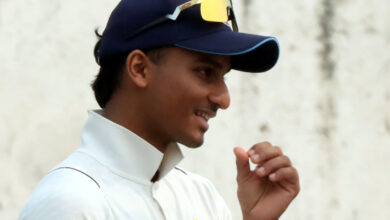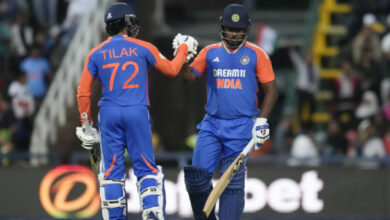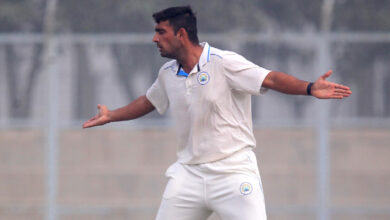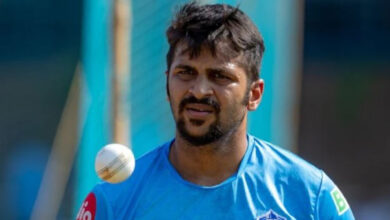Obsession to succeed: Dropping out of school, selling house, taking loans, changing food habits make Sankar Muthusamy a Junior Badminton Worlds final

Bold, ambitious parenting decisions with clarity of thought on goals and paying no heed to society’s conventions helped Muthusamy Subramanian raise a junior badminton Worlds medall in Sankar. The 18-year-old was given the freedom his father to drop out of the schooling system in Class 8 because even the “one week to give exams through open school would eat into his badminton time,” recalls ser Priyanka, who too was encouraged to go deep into the sport till an ankle injury ended her singles dreams.
Taking on a massive debt, selling the house and facing crinkled noses of relatives, allowing Sankar to not be restricted to four conventional meals, but eating 12-13 portions so that he stayed flexible about food when travelling, arranging for meat even when the family grew up vegetarian, and sticking to a smaller academy in Chennai were some of the unconventional calls taken the family in raising the final. Sankar, very defiantly, is also hoping to stay true to his defensive-retrieval style of play, when international badminton demands an attacking finishing stroke.
🥈 for 🇮🇳’s Sankar Muthusamy at #WJC2022
Sankar, a TOPS Development Athlete, fought hard but lost to 🇹🇼’s Kuo Kuan Linin (14-21 20-22) to get 🥈at BWF World Junior Championships 🏸, becoming only 2nd Indian Male Singles player after Sirnil Verma to do so🔥
Way to go champ🙌 pic.twitter.com/Af1sxnupHH
— SAI Media (@Media_SAI) October 30, 2022
When he went down to Kuo Kuan Lin 21-14, 22-20 in the finals at Santander, it was the difference in power strokes that was most visible. The taller opponent’s blering game also put pressure on Sankar’s defence and shortened the rallies, taking his biggest strength out of the equation. A bunch of errors cascaded, though Sankar showed grit to go from 14-20 down in the second game to 20-20 revving up his speed. But Kuo’s cross smashes proved far too much. The final was a glimpse of what the seniors circuit will look like, and a test of whether Sankar can stick to his unconventional defensive game.
Muthusamy’s family hasn’t shirked away from veering off the conventional path.
It started with encouraging a young Sankar to learn to write, eat and play badminton with either/both hands. “We forced him to eat with the right, though he was a natural left-hander, but not for superstition. My father wanted him to grow up ambidextrous. So initially he played badminton with both hands, but was slightly more comfortable with left,” Priyanka recalls. “When we played cricket, he could easily bowl with his right hand.”
Muthusamy played tennis at Tutthukodi and loved the sport to bits even when he came to Chennai. “I think Dad believes there’s no other profession that gets the respect that sport does. It’s different and it teaches you life,” Priyanka adds, a philosophy that would consently define his decisions.
“When playing and travelling costs increased, we sold the house, moved to a rented place. And there’s lots of loans which I hope get cleared after this World Championship result. I’m not saying relatives and sponsors didn’t chip in, but it’s never enough when you are coming up. Parents never let us realise the struggle, but the mounting debt must’ve been tough,” she adds.
Priyanka recalls relatives piling on the pressure – first the hoo-ha when Sankar quit school, and later on the loans. “The way people look at you, and give their opinion about how sports was a waste of money. When we sold the house, there was more unnecessary advice and pressure from relatives. But Dad doesn’t bother, he’s so clear,” she recalls of the cost of shuttles, tournament entry fees and her father calmly selling the house to fund Sankar’s career.
The road less travelled
Quitting school flowed on the same lines. “Initially, the school principal was encouraging and he played CBSE cluster meets. But then, a strict one came and his attendance was poor because he was always in practice or resting. That one week of exams was also a drain on his time. So, he stepped away from the schooling system,” Priyanka recalls.
Nutrition was another priority, and Sankar consciously learnt to adapt to whatever was available when travelling and not fussing, refusing to see comfort in food. “My mother used to work long hours earlier and never liked cooking. But she ensures he gets all the nutrition, and arranges for non-veg for him so he gets stronger though we are vegetarians. Sankar keeps on eating, not the fixed four meals. He’ll have 12-13 portions of healthy food at small intervals and eat whatever he gets when travelling,” she says.
Sankar was obsessed with Chinese southpaw legend Lin Dan as a child, and watched his videos for hours – learning footwork and grip and mimicking strokes. Later, Japanese Kento Momota would embolden his decision to stick to a defensive game. “In age-group tournaments, Sankar never had any power and was tinier than the rest. One reason he developed a rally game was because other boys were bigger and stronger and he couldn’t match their power. So he worked on speed and stamina,” Priyanka explains.
Training drills at the Fireball Academy were designed around him – and he was given access to the gym and swimming pool to work out whenever he pleased. “He never misses fitness sessions, loves it more than court drills. He follows Virat Kohli in that. He used to cry earlier when he lost and Dad would counsel him. But he never lost the slightest interest in badminton. I would feel dejected. But Sankar – win or lose, his focus never waned. It came from my Dad’s clarity.”
Never one to gather lots of friends, Sankar would stay focused, submerged in his sport, and wade past a small rebellious stage from age 13-15. “He settled down later. There was no time to rebel for the sake of it,” she adds. Tamil songs, and treating himself to movies if the week had logged in a “satisfactory training session or two” were his switching-off.
The family is determined to stick to Chennai and continue with unconventional drills for Sankar to rise in badminton. “The power will come age 21. But right now, we want to take him to a gear higher in speed and fitness. And I personally want to drag him to a vacation. The last one needed a knee injury to whisk him away from the sport,” Priyanka says.







